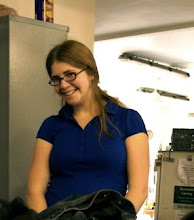Yesterday was the last day of classes at Pardes - bittersweet, for sure. Now, everyone's caught up in the whirlwind of packing up and saying goodbye. But amidst all that hullabaloo, here's some Torah from my last gemara class.*
"If, in the land that Adonai your God is assigning to you to possess, someone slain is found lying in the open, the identity of the slayer not being known, your elders and magistrates shall go out and measure the distances from the corpse to the nearby towns..." (Deut. 21:1-2)
Deuteronomy 21 goes on to describe the ritual that the leaders of the city closest to the corpse need to do. The description ends with this declaration: "Our hands did not shed this blood, nor did our eyes see it done. Absolve, O Adonai, Your people Israel whom you redeemed, and do not let guilt for the blood of the innocent remain among Your people Israel." And they will be absolved of blood guilt. (21:7-8)
The mishnah (Bavli Sotah, 45b) goes on to say:
לא בא לידינו ופטרנוהו, לא ראינוהו והנחנוהו
It didn't come to our hands - and we are exempt, we did not see it - and it rests/it's ok with us. (loosely, not such a great translation)
The gemara (Masechet Sotah 46b) asks the question - how is it that this corpse got there in the first place? There are 2 points of view, one placing the fault on the legal and security system, the other, taking a more systemic perspective, says that it's our responsibility for not ensuring this person's basic needs - or else why would s/he have been wandering around outside the walls of the city alone in the first place? They go one step further, saying exactly what those basic needs are - מזון, food, and לויה, companionship.
This verb "to see לראות," which comes up in the Torah verse, in the Mishna, and again in the gemara, drew my attention. Rabbi Jonathan Sacks writes about another use of it: "I was young and now am old, yet I have never seen the righteous forsaken or their children begging for bread. נער הייתי וגם זקנתי ולא ראיתי צדיק נעזב וזרעו מבקש לחם" (Psalms 37:25) This verse is at the end of Birkat haMazon, and is deeply troubling, because at surface value, it is blatantly untrue. Can we really say that everyone who is hungry is hungry because they haven't been righteous? Sacks writes that he learned that we can understand the word "see - ראיתי" like it used in the Book of Esther, where Esther cries out to the king, "How can I bear to see the disaster which will befall my people! And how can I bear to see the destruction of my kindred!" (Esther 8:6) Sacks writes, "'To see' here means 'to stand still and watch.' The verse [from Psalms] should thus be translated, 'I was young and now am old, but I never merely stood still and watched while the righteous was forsaken or his children begged for bread." (Sacks, To Heal a Fractured World, p. 58)
This idea of seeing, and of seeing what isn't always obvious or easy - the dead body outside the city walls and hunger in our texts, and many of the things here in Israel I've written about on this blog since August - has been a central part of my focus this year. I started this blog saying I intended to see what kind of land this was. For me, that's included going to the West Bank and learning how the Israeli-Palestinian conflict impacts real people, engaging with some of Israeli society's most challenging issues through Pardes' social justice track, and not being oblivious to the position of liberal Judaism in Israeli society. Last summer, I was sitting with one of my rabbis, Rabbi Lehmann, and I said that I couldn't imagine living in Jerusalem and not dealing with these issues (in that conversation, speaking specifically about Israeli-Palestinian issues, but I think it applies to all of these). Rabbi Lehmann replied, "You're right, I don't think you could live in Jerusalem and ignore them, but plenty of other people do so very easily." It's too easy to ignore, and to not see, or to see and simply stand by...
When I was in Israel summer 2007 as a counselor for a NFTY in Israel trip, we brought our participants to Jerusalem on their 2nd or 3rd day in Israel. We had them put on blindfolds on the bus as we drove into the city and to the Tayelet, where there is a beautiful overlook of the Old City. When we arrived, we led them off the bus towards the overlook, and I talked to them about the summer and their time in Israel being an opportunity for פוקח עורים - opening their eyes to all that Israel had to offer. For me, it's about balancing both of these - taking in the wonders of Israel and the sights, smells, sounds of this country, but also seeing what lies beneath the surface.
So as I close out this year, prepare for a month's vacation in the States and to transition into my second year studying here in Israel, I'm thinking about how to continue holding that balance. Shabbat shalom!
*Let's be honest, it's really a procrastination technique so I don't have to pack.
Dvar Torah for Dr. Harlan Daman’s 19th Yahrzeit
3 months ago



